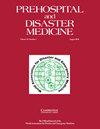英国和爱尔兰共和国 COVID-19 大流行期间伦理指导文件中的伦理原则:定性系统回顾
IF 2.5
4区 医学
Q2 EMERGENCY MEDICINE
引用次数: 0
摘要
背景:冠状病毒病 2019(COVID-19)大流行的突然爆发伴随着无数的伦理问题,促使大不列颠及北爱尔兰联合王国(英国)和爱尔兰共和国为临床、研究和公共卫生领域的医护人员发布了各种伦理指导文件。本综述旨在确定 COVID-19 大流行期间英国和爱尔兰发布的伦理指导文件中的主要原则。方法:本综述采用定性系统综述法和专题综合法,分析了所纳入的伦理相关指导文件(如本综述所定义的),这些文件发表于 2020 年 3 月至 2022 年 3 月期间的英国和爱尔兰。检索包括在谷歌学术(Google Scholar)中进行一般检索,以及在两国相关专业机构和公共卫生部门的网站上进行有针对性的检索。采用恒定比较法(CCM)对这些文件中的伦理原则进行了分析。结果:有 44 份指导文件符合纳入和排除标准。确定了十项主要伦理原则,即:公平、诚实、伤害最小化、相称性、责任、自主、尊重、知情决策、护理责任和互惠。结论:指导方针并没有同样详细地介绍伦理原则。有些原则缺乏定义,容易被文件的最终用户误解。集体主义伦理往往优先于个人主义伦理。未来的伦理指导文件需要进一步明确,以便在类似情况下更好地指导医护人员。本文章由计算机程序翻译,如有差异,请以英文原文为准。
The Ethical Principles in Ethical Guidance Documents during the COVID-19 Pandemic in the United Kingdom and the Republic of Ireland: A Qualitative Systematic Review
Background: The sudden onset of the coronavirus disease 2019 (COVID-19) pandemic was accompanied by a myriad of ethical issues that prompted the issuing of various ethical guidance documents for health care professionals in clinical, research, and public health settings throughout the United Kingdom (UK) of Great Britain and Northern Ireland and the Republic of Ireland. The aim of this review was to identify the main principles in ethical guidance documents published in the UK and Ireland during the COVID-19 pandemic. Methods: This review used a qualitative systematic review methodology with thematic synthesis to analyze the included ethics-related guidance documents, as defined in this review, published in the UK and Ireland from March 2020 through March 2022. The search included a general search in Google Scholar and a targeted search on the websites of the relevant professional bodies and public health authorities in the two countries. The ethical principles in these documents were analyzed using the constant comparative method (CCM). Results: Forty-four guidance documents met the inclusion and exclusion criteria. Ten main ethical principles were identified, namely: fairness, honesty, minimizing harm, proportionality, responsibility, autonomy, respect, informed decision making, duty of care, and reciprocity. Conclusion: The guidelines did not present the ethical principles in equal detail. Some principles lacked definitions, leaving them vulnerable to misinterpretation by the documents’ end users. Priority was frequently given to collectivist ethics over individualistic approaches. Further clarity is required in future ethical guidance documents to better guide health care professionals in similar situations.
求助全文
通过发布文献求助,成功后即可免费获取论文全文。
去求助
来源期刊

Prehospital and Disaster Medicine
Medicine-Emergency Medicine
CiteScore
3.10
自引率
13.60%
发文量
279
期刊介绍:
Prehospital and Disaster Medicine (PDM) is an official publication of the World Association for Disaster and Emergency Medicine. Currently in its 25th volume, Prehospital and Disaster Medicine is one of the leading scientific journals focusing on prehospital and disaster health. It is the only peer-reviewed international journal in its field, published bi-monthly, providing a readable, usable worldwide source of research and analysis. PDM is currently distributed in more than 55 countries. Its readership includes physicians, professors, EMTs and paramedics, nurses, emergency managers, disaster planners, hospital administrators, sociologists, and psychologists.
 求助内容:
求助内容: 应助结果提醒方式:
应助结果提醒方式:


